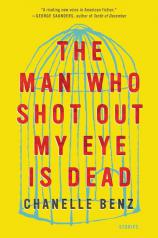The Man Who Shot Out My Eye Is Dead: Stories
Review
The Man Who Shot Out My Eye Is Dead: Stories
You will come for the title and stay for the stories. As you scan book covers (or however one discovers new books in these brave new days), THE MAN WHO SHOT OUT MY EYE IS DEAD certainly attracts and arrests the attention. Be advised: This collection of short fiction by Chanelle Benz should not be classified under “thriller,” the title notwithstanding. Once you open it and begin reading, you encounter a discordant and varied group of voices, scattered over time and place, each finding its own key. The result is by turns quietly heartrending, disturbing and, when all is said and done, unforgettable.
"Once you open it and begin reading, you encounter a discordant and varied group of voices, scattered over time and place, each finding its own key. The result is by turns quietly heartrending, disturbing and, when all is said and done, unforgettable."
These stories move in and out of genres, time and space, from Europe in the early 19th century to the United States in the near future. Expect anything; you will not be disappointed. I was reminded here of Joyce Carol Oates, there of Doris Lessing, yet Benz’s work is ultimately and distinctly her own. Each story has its own odd and different voice. In “The Mourners,” in which the title of the book originates as dialogue, a woman on the western frontier in the 1800s who has experienced tragedy all of her life finds a way to gain a measure of revenge. It is linked, in a way, to the subject matter of “Recognition,” a futuristic tale detailing the circumstances surrounding an archaeological dig that has uncovered the relics of a 20th-century commune and its unforeseen consequences.
“Adela,” which is presented in the form of a story written by an anonymous author in 1829 (with scholarly footnotes appended), is a simple enough tale concerning a group of children who attempt to play matchmaker for an older and unmarried woman, with surprising results. “Accidental,” however, is as contemporary as can be. It is my favorite story in the collection, a tale of the unintended consequences of poor choices and bad judgment that resonate into the future and between generations, played out against the backdrop of the Mississippi Gulf Coast. Benz also visits the Protestant Reformation of 16th-century England in “That We May Be All One Sheepfolde,” a story of unexpected revelations, violence and revenge that closes the collection.
There are paragraphs in THE MAN WHO SHOT OUT MY EYE IS DEAD that you will want to underline and reproduce, the better to carry them with you forever. One in particular is contained in the story with the somewhat unwieldy title of “The Peculiar Narrative of the Remarkable Particulars in the Life of Orrinda Thomas, An American Slave,” presented in the form of a found document, which narrates the tale of a betrayal, ultimately put paid by proxy and with violence, set in antebellum Louisiana. The paragraph in question deals with the conflict between doing what is wrong and doing what is comfortable, and will haunt you long after you read the story’s closing words. This debut collection is filled with such passages.
If you wish to see what a brilliant new literary talent looks like as she breaks through to the world, look no further.
Reviewed by Joe Hartlaub on January 27, 2017
The Man Who Shot Out My Eye Is Dead: Stories
- Publication Date: December 12, 2017
- Genres: Fiction, Short Stories
- Paperback: 240 pages
- Publisher: Ecco
- ISBN-10: 0062490788
- ISBN-13: 9780062490780





